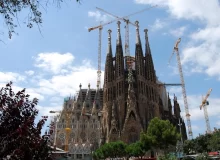How to Drink Your Bread
Donna Dailey meets the innovative Brussels brewers who are taking Belgian craft beer into the 21st century.
Olivier de Brauwere has the perfect surname for his profession. It means “the brewer”, and together with his partner Sébastien Morvan, he is leading the charge to create a new generation of Belgian craft beers at the Brussels Beer Project.
This is no small ambition. After all, along with chocolate, beer is Belgium’s most famous export. Its origins trace back to the monasteries of the 12th century, when monks concocted the first artisan brews.
Today, Belgium’s 200 breweries produce an astonishing 1600 different beers. They range from traditional Trappist and abbey-style beers to those of Anheuser-Busch InBev, the world’s biggest brewer, which has its headquarters here.

“Our dream is to be the Trappists of the 21st century,” Olivier says with an almost religious zeal. “We’re trying to refresh the Belgian brewing scene, to give it a fresh accent.”
The partners – or co-creators as they prefer to be called – aim to bring innovation and daring into what they see as a somewhat too conservative brewing environment. And their vision is hitting the mark. They produce around 750,000 bottles a year and export their beers to 20 countries, including Japan.
“We don’t want the US to be the only ones influencing the future of beer,” Sébastien adds. “We want Belgian beer to be the beer of today.”
The pair met at university, where they shared an enthusiasm for beer, and started the Brussels Beer Project eight years later, in 2013. In just four years, they’ve become the fastest growing brewery in Belgium, producing 30 different beers annually. What’s even more impressive is the small urban brewery in which they do it.
Brussels Beer Project is situated near the canal in Dansaert. This was, appropriately, a traditional brewing area of the city; brewers bought their hops round the corner on Hopstraat. Now the neighbourhood is on the upward trend with new clubs and jazz bars.
Bright blue and white graphics pull you inside to the tap room, a cosy space with a sofa under the window and low, cushion-topped stools beneath a rack of wooden kegs. More bold graphics line the walls above the bar, where patrons chat with the bartenders as they sample the latest brews. After work on a Friday night, it’s…erm…. hopping.
“We opened this tap room to create a local community around the beer,” Olivier says as he leads us past the bar into the large back room that houses the brewery. “We want to educate people away from the industrial beers to more craft beers.”
One side of the brewery is taken up with long tables, where a merry party is thoroughly enjoying their lessons. Small group tastings, which you can book in advance, give a bird’s eye view of eight shiny silver stills where the magic happens.
As we watch one of the workers pouring hops into a still, Olivier describes the beer-making process. For this batch, he tells us, they are using apples from the gardens of Brussels.

“We buy from an organization that collects apples from local people that would otherwise go to waste and use it in the autumn beer,” he says. “It takes half a ton of apples for 15,000 litres.”
Apples? In beer?
“We are an experimental brewery,” he explains. “It’s very much an intuitive method, where art meets science. We have lots of ideas and we like to recreate those ideas. We like to play with our recipes. We’re not afraid to fail. That’s different from the big breweries who always have to get it right. We like to push the boundaries.”

This attitude led to the creation of Babylone, the first beer made with fresh bread. They buy it from another organization that collects unsold bread from city bakeries and sandwich shops, and use it for the starch.
“We dry it, mill it, and use the flour in the beer,” Olivier says. “It takes 60 kilos of bread for 1,000 litres of Babylone. Two slices of bread in each bottle!”
They shared the process with a London brewery which now produces Toast Ale for Feedback, a food waste charity. And celebrity chef Jamie Oliver sells Babylone in his London restaurants.
These beers are a perfect example of the Brussels Beer Project’s community ethos. Buying ingredients from non-profit organizations helps invest in local projects. And by using leftover apples and bread that would otherwise be discarded, they are helping to tackle food waste.
“We want to be more than just a simple brewery,” Olivier tells us. “Our goal is to be involved in the community, to play a role in Brussels’ development.”
Craft breweries like Brussels Beer Project are indeed leading the city’s revival as a beer capital. In the early 20th century there were 200 breweries in Brussels alone; now that’s the number in all of Belgium.
“Five years ago, there was only one brewery in Brussels. Now we have six,” Olivier says. “Before, the breweries moved out because they needed more space for industrial production. With craft beers, they don’t need a huge space. They can go back into the cities. Brussels is becoming the brewing center of Belgium once again.”
We head back to the taproom, where Sébastien is waiting with beers for us to try. It’s an interesting and exciting range that includes Grosse Bertha, a sweet Belgian Hefeweizen; a coffee pale ale called #EXP 0038 that’s absolutely delicious; Jungle Joy, which is spiced with tropical fruits, and Dark Sister, a black IPA.
The famous Babylone contains hops that give it a slightly resinous scent and taste. It’s unusual, and indeed seems a little like drinking a slice of bread.
I’m not usually a fan of IPAs, so I’m surprised to find that one of my favourites is the Delta IPA. It has a lovely spice on the nose, and is brewed with Belgian, German and American hops to give it a fruity taste.
This was, in fact, their first beer, and true to the millennial spirit of the company, it was chosen from four prototypes in a crowd-funding event during the brewery’s maiden year. Beer for Life, an annual crowdfunding club of 2,500 supporters, continues to select a new recipe every year to be added to the range of classic, regular brews.
Above our table, giant graphics spell out a Brussels Beer Project slogan on the opposite wall: Hello 21st Century, Good Bye Middle Ages.
“We don’t want to see Brussels as a museum of beer,” Sébastien says. “This is a very urban, very cosmopolitan city of one million people. We want to integrate this into the beer.”
Their team of 13 people includes a Portuguese brewer and people from Italy and the USA. “We like to have influences from all of them,” Olivier adds. “We have been ageing in wine barrels, and in whisky barrels from Kentucky and from Scotland. We try to put as much fun as we can into the beer.”
As they head back to the brewery, leaving us with fresh bottles of Babylone, we return to drinking our bread. I’ll take this over a sandwich any day.
Brussels Beer Project
rue Antoine Dansaert 188
1000 Brussels
http://www.beerproject.be/en
Open Thursday, Friday and Saturday 2pm – 10pm
To arrange a private tasting (15 people minimum), email keepintouch@beerproject.be












